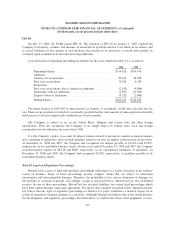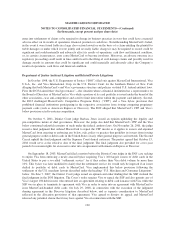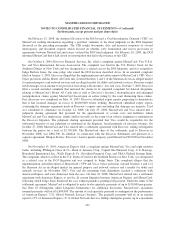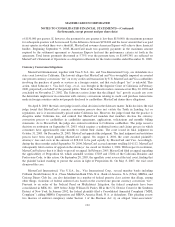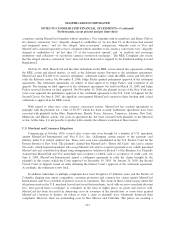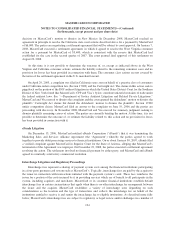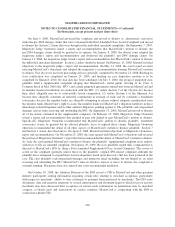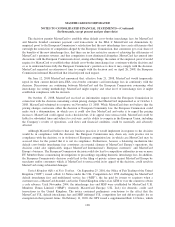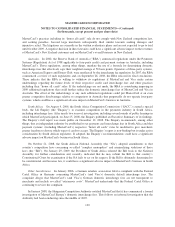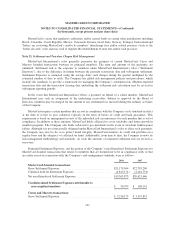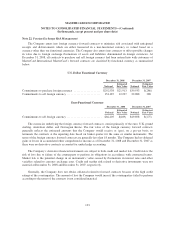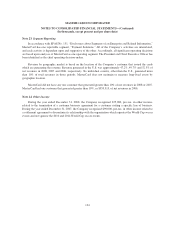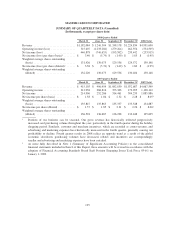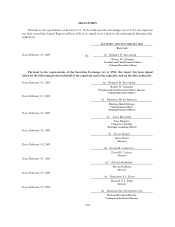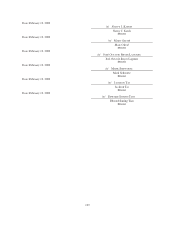MasterCard 2008 Annual Report Download - page 139
Download and view the complete annual report
Please find page 139 of the 2008 MasterCard annual report below. You can navigate through the pages in the report by either clicking on the pages listed below, or by using the keyword search tool below to find specific information within the annual report.MASTERCARD INCORPORATED
NOTES TO CONSOLIDATED FINANCIAL STATEMENTS—(Continued)
(In thousands, except percent and per share data)
also contained preliminary conclusions challenging MasterCard’s U.K. interchange fees (but not the MSF) under
the Competition Act. On November 10, 2004, the OFT issued a third notice (now called a Statement of
Objections) claiming that the interchange fees infringed U.K. and European Union competition law.
On November 18, 2004, MasterCard’s board of directors adopted a resolution withdrawing the authority of
the U.K. members to set domestic MasterCard interchange fees and MSFs and conferring such authority
exclusively on MasterCard’s President and Chief Executive Officer.
On September 6, 2005, the OFT issued its decision, concluding that MasterCard’s U.K. interchange fees that
were established by MMF prior to November 18, 2004 contravene U.K. and European Union competition law.
The OFT decided not to impose penalties on MasterCard or MMF. MMF and MasterCard appealed the OFT’s
decision to the U.K. Competition Appeals Tribunal. On June 19, 2006, the U.K. Competition Appeals Tribunal
set aside the OFT’s decision, following the OFT’s request to the Tribunal to withdraw the decision and end its
case against MasterCard’s U.K. default interchange fees in place prior to November 18, 2004.
Shortly thereafter, OFT commenced a new investigation of MasterCard’s current U.K. default credit card
interchange fees and announced on February 9, 2007 that the investigation would also cover so-called
“immediate debit” cards. To date, the OFT has issued a number of requests for information to MasterCard
Europe and financial institutions that participate in MasterCard’s payment system in the United Kingdom.
MasterCard understands that the OFT is considering whether to commence a formal proceeding through the
issuance of a Statement of Objections. If the OFT ultimately determines that any of MasterCard’s U.K.
interchange fees contravene U.K. and European Union competition law, it may issue a new decision and possibly
levy fines accruing from the date of its first decision. MasterCard would likely appeal a negative decision by the
OFT in any future proceeding to the Competition Appeals Tribunal. Such an OFT decision could lead to the
filing of private actions against MasterCard by merchants and/or consumers which, if its appeal of such an OFT
decision were to fail, could result in an award or awards of substantial damages.
Poland. In April 2001, in response to merchant complaints, the Polish Office for Protection of
Competition and Consumers (the “PCA”) initiated an investigation of MasterCard’s (and Visa’s) domestic credit
and debit card default interchange fees. MasterCard Europe filed several submissions and met with the PCA in
connection with the investigation. In January 2007, the PCA issued a decision that MasterCard’s (and Visa’s)
interchange fees are unlawful under Polish competition law, and imposed fines on MasterCard’s (and Visa’s)
licensed financial institutions. PCA also decided that MasterCard (and Visa) had not violated the law.
MasterCard and the financial institutions appealed the decision. On November 12, 2008, the appeals court
reversed the decision of the PCA and also rejected MasterCard’s appeal on the basis that MasterCard did not
have a legal interest in the PCA’s decision because its conduct was not found to be in breach of the relevant
competition laws. MasterCard has appealed this part of the appeals court’s decision because it has significant
interest in the outcome of the case. The PCA has appealed other parts of the decision. If on appeal, the PCA’s
decision is ultimately allowed to stand, it could have a significant adverse impact on the revenues of
MasterCard’s Polish customers and on MasterCard’s overall business in Poland.
New Zealand. In November 2003, MasterCard assumed responsibility for setting domestic default
interchange fees in New Zealand, which previously had been set by MasterCard’s customer financial institutions
in New Zealand. In early 2004, the New Zealand Competition Commission (the “NZCC”) commenced an
investigation of MasterCard’s domestic interchange fees. MasterCard cooperated with the NZCC in its
investigation, made a number of submissions concerning its New Zealand domestic default interchange fees and
met with the NZCC on several occasions to discuss its investigation. In November 2006, the NZCC filed a
lawsuit alleging that MasterCard’s (and Visa’s) domestic default interchange fees and certain other of
129


